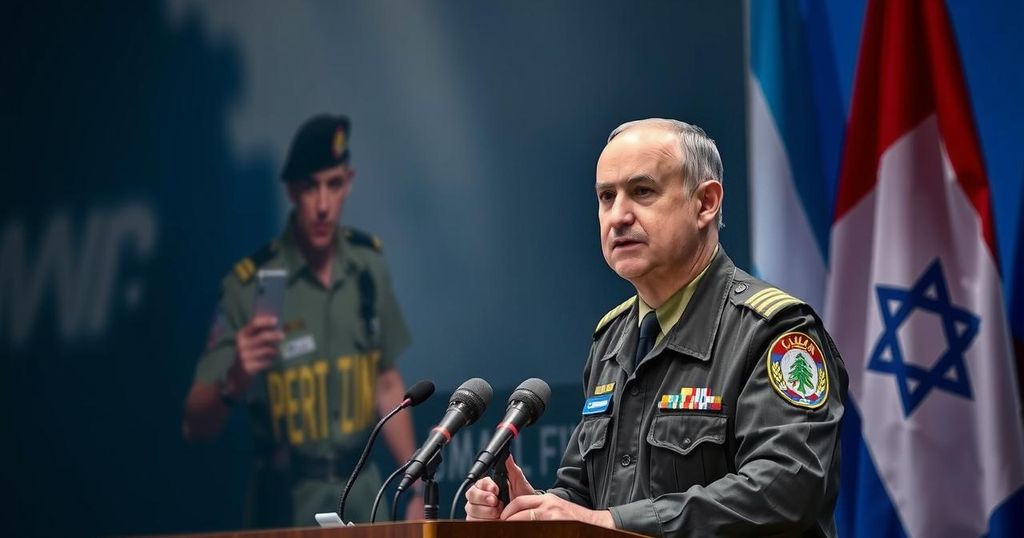Israel Katz, Israel’s new Defense Minister, declared there will be “no ceasefire” in Lebanon amid ongoing military actions against Hezbollah, which have resulted in over 3,000 deaths. Katz emphasized Israel’s commitment to achieving military goals, contrasting with earlier claims of negotiating a ceasefire by Foreign Minister Gideon Saar. The humanitarian crisis remains dire, with significant displacement in Lebanon and Gaza.
In a recent statement, Israel’s newly appointed Defense Minister, Israel Katz, emphatically rejected any notion of a ceasefire in Lebanon, asserting that there will be “no ceasefire” and “no respite” in the ongoing military operations. Katz stated on social media that Israel will persist in targeting Hezbollah until its military objectives, including the disarmament of the group and the safe return of residents to northern Israel, are fully satisfied. He emphasized that any agreement must safeguard Israel’s right to combat terrorism independently. Katz’s remarks come after the Israeli military campaign has resulted in over 3,243 fatalities in Lebanon since October 7, 2023, amidst the larger conflict that has displaced approximately 1.2 million people in the country. He was appointed to the role after a strategic disagreement led to the dismissal of Yoav Gallant by Prime Minister Benjamin Netanyahu. This military escalation follows an earlier statement by Foreign Minister Gideon Saar, who suggested some progress in ceasefire negotiations, though a Hezbollah spokesperson claimed that they were not part of any discussions. At a recent summit in Riyadh, Lebanon’s caretaker Prime Minister Najib Mikati described the current crisis as “unprecedented,” while Iran’s Vice President highlighted a global anticipation for potential changes in U.S. policy that could influence Israel’s actions against both Hamas and Hezbollah. With continuous rocket fire from Lebanon forcing thousands of Israelis to evacuate, the humanitarian situation remains critical. Despite international calls for increased aid to Gaza, the Israeli government reported that assistance levels to the territory have drastically dwindled. As events unfold, the region faces increased tension and instability, reflecting the complexities of ongoing hostilities and international diplomatic efforts.
The ongoing conflict between Israel and Hezbollah has heightened significantly since early October 2023, resulting in tragic loss of life and a humanitarian crisis in Lebanon and Gaza. Israel’s military actions in Lebanon have been marked by airstrikes and ground operations, targeting Hezbollah, especially in response to rocket attacks that have impacted northern Israeli communities. The Israeli government has faced accusations of excessive use of force and has been placed under scrutiny regarding its military strategies by various international bodies, including calls from the International Criminal Court for accountability regarding actions that may constitute war crimes. The complex political landscape, which involves historical grievances, power dynamics, and external influences from countries such as Iran, complicates the prospect of peace negotiations and stability in the region.
In conclusion, the rejection of a ceasefire by Israel’s Defense Minister, Israel Katz, underscores the ongoing severity of the conflict in Lebanon and the broader Middle East crisis. The Israeli military’s commitment to targeting Hezbollah continues to escalate the humanitarian crisis, as thousands are displaced and casualties mount. The contradiction between Katz’s statements and those of Foreign Minister Gideon Saar illustrates the ongoing internal divisions within the Israeli government regarding strategy. As international bodies monitor the situation, the urgent need for humanitarian assistance in both Lebanon and Gaza remains critical amid increasing regional instability.
Original Source: www.theguardian.com






